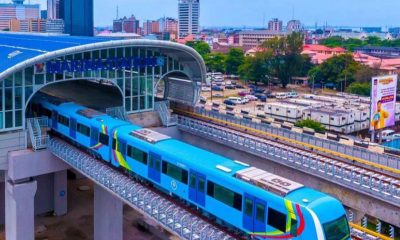Economy
LagRide: Difficult payment conditions put off potential subscribers

By ADEBAYO OBAJEMU
The recently announced Lagos Ride (LagRide) programme by the Governor of Lagos, Mr. Babajide Sanwo-Olu, may already be facing hurdles in its implementation as initial response to it has been at best lukewarm. With the first batch of 1,000 brand-new GAC-branded automobiles, otherwise known as Lag Ride, for a safe, comfortable and modernised taxi scheme, introduced in the state to rival operations of Uber, Bolt and others, checks revealed that the target clientele and beneficiaries have not shown much interest.
The ride-hailing taxi initiative, which is being operated on a lease-to-own basis, is a component of the state governments multimodal transportation blueprint being executed under the Traffic Management and Transportation pillar of the THEMES agenda of the Sanwo-Olu administration.
The initiative is a partnership between Lagos State-owned Ibile Holding Limited and CIG Motors Company Limited, with the objective to provide clean and reliable means of taxis movement across the metropolis at affordable cost, using brand-new vehicles.
But as excellent as the scheme is, intending drivers who are desirous of being part of the scheme have complained of the initial down payment of N1.9 m which they say is on the high side, considering the situation of the country. Operators are required to pay about N1.9 million down payment, of which the sum covers the 20 per cent equity of cost of vehicle, registration and insurance.
Sola Tolumade , who said he has been a driver for ten years told Business Hallmark that the amount being demanded as down payment “is on the high side. I wonder why this government would peg the initial payment at N1.9 m, if I had that amount, I could on my own acquire a fairly used Danfo in good condition.
“I agree that the government has done well in spreading the lease to ownership repayment process to three years, but the initial payment is high, considering that drivers will be responsible for fuelling of the vehicle”, Tolumade said.
Another driver who plies Agege-Iju- Ishaga route in his tricycle, Martin Chukwumah said “the initiative is good, at least it will complement those of other taxi-hailing companies, such as Uber and Bolt. When I heard of the initiative I was happy and wanted to be part of it, but where will I get the initial sum of N1.9 million down payment demanded?”
Each car being used in the scheme comes with technology-enabled security features that monitor every journey undertaken. The Lagos governor at the launch a couple of weeks ago said the state had moved another step forward in its drive to develop an efficient transportation model in tune with modernity and comfort.
He explained that the aim was not to run existing ride hailing operators out of the business but to offer safer alternatives and clear the roads of rickety cars being used for taxi business. The scheme, he said, would provide opportunities to the operators to become owners of the vehicles within a three to four-year period.
The need to provide better, dignifying and more rewarding means of transportation and livelihood for unemployed and underemployed population gave birth to the new Lagos State Taxi Scheme, which will be operated on a lease-to-own basis.
Under this arrangement, a beneficiary will be provided with a brand-new car which will become the drivers property after completion of the payment of the vehicles subsidised cost.
This taxi scheme will complement the various bus services which are making a significant impact in the lives of our people; the water transport service, which is recording unprecedented patronage, as well as the Blue and Red Line Rail services which are on course to commence commercial operations between the last quarter of this year and the first quarter of 2023.
To improve riders and passengers security, Mr. Sanwo-Olu said a full security gadget, including a 360 dashboard camera that will give 24-hour audio-visual feeds to the control centre, had been pre-installed on each car deployed for the scheme.
He added that each car came with a physical panic button that could be used by anyone on board in case of assault or emergency. The panic button, the governor said, was also on the mobile application and is connected to the Control and Command Centre.
Mr. Sanwo-Olu disclosed that the automobile assembly plant being set up in Lagos — another component of the partnership between CIG Motors and the State Government — stood at 60 per cent completion, with anticipated launch and start of operations expected in September.
“What we are witnessing today is that Lagos is moving away from the era of rickety kabu kabu to a brand-new, comfortable and safe transport system. The multiplier effect of this singular initiative on job creation, youth employment and economic growth and development in the State cannot be overstated,” he said.
The panic button, the governor said, is also on the mobile application and is connected to the Control and Command Centre. All trip fares are expected to be remitted electronically via the Lagos Ride platform. Where a rider is carrying physical cash, you will be required to credit the equivalent sum in value to the wallet of the driver.
The vehicles assigned to drivers will remain the property of Ibile Holdings until the full payment is made after which the title and ownership will then be completely transferred to the driver.
The drivers are required to service debt using daily fares for the first two years. After this, they can pay down the debt and get out of the obligation.
According to the governor “No outright payment shall be honoured in the first two years. Maintenance and all insurance considerations shall be executed on behalf of the drivers, however, the driver shall be responsible for fuelling the vehicle.
“Drivers will be required to comply with all maintenance service schedules or calls for maintenance as non-compliance will attract a penalty.
“All maintenance requests or complaints about the vehicle are expected to be lodged in the maintenance module in the drivers mobile app. Any cost or damage incurred from taking the vehicle to an unauthorised service centre, or without prior notice, shall be borne by the drivers.
“A mandatory fee of N8,709 shall be deducted from the drivers wallet daily to service the debt obligation and 25% for service fee. Drivers can fund their wallets from other sources, aside from fares, to service the daily debt obligation.
In the case of insufficient funds, it is learnt the drivers account will be debited and the value deducted once it is sufficiently funded.
The Lagos State Commissioner for Transportation, Dr. Frederic Oladehinde, during the launching of the scheme said that to make the ride affordable, the technology on which the scheme is operated had made ride-sharing possible for passengers, who would agree to share ride and share transit costs. Many Lagosians have commended the administration for the initiative, saying this will provide alternative to Uber and Bolt, and through the stiff competition the fares will come down.
Joke Adeniyi, a fashion designer in a chat with BusinessHallmark said “the initiative is a good one and I must commend the state government. This is especially remarkable given that the idea comes with security infrastructure.
Laide Fowosere, a petty trader said what is important is to ensure that the Lag Ride fare is within what the ordinary Lagosians can afford.
“There’s no doubt that Lagosians still suffer from acute transportation difficulties, and for me, this is not acceptable”, she said.











